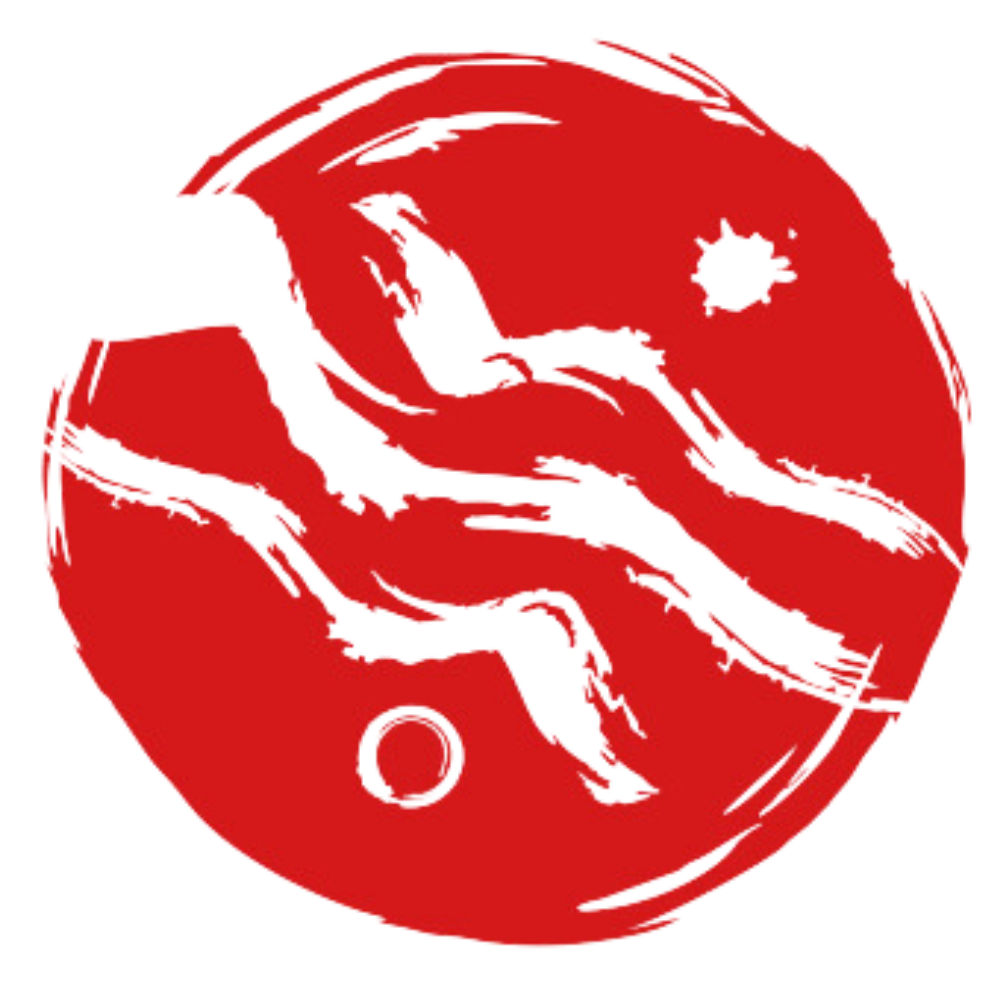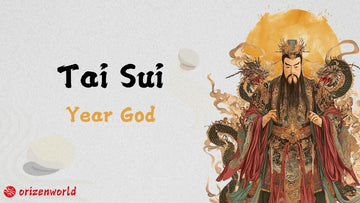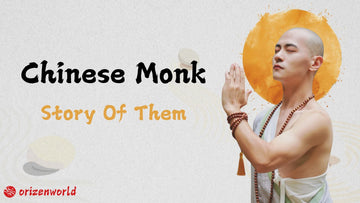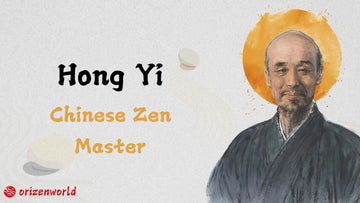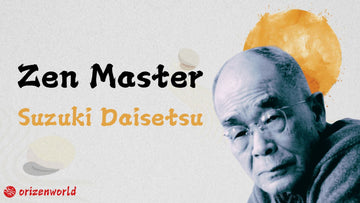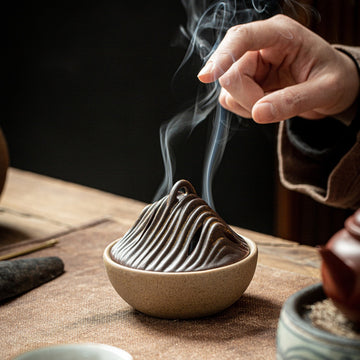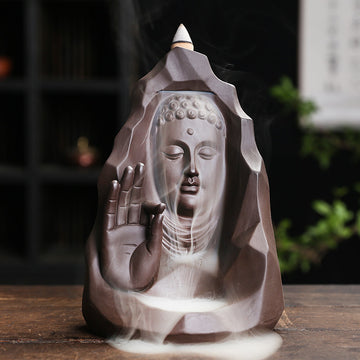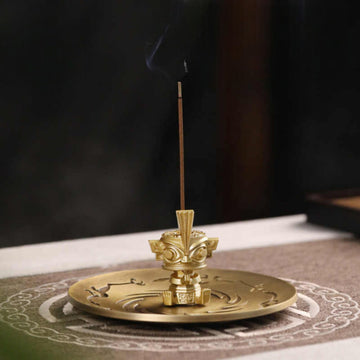In China, there's a saying for those facing a streak of misfortune: "犯太岁" (Fan Tai Sui). This concept refers to being "in conflict with Tai Sui," a deity tied to the Chinese zodiac and lunar calendar. Many who believe in feng shui pay close attention to Tai Sui each year, taking precautions to avoid potential challenges.
But who is Tai Sui? Why does it have such an impact on fortune and well-being? Every year, people consult zodiac alignments and feng shui guidance to understand Tai Sui's influence and make preparations to mitigate its effects.
Curious to learn more? In today’s article, we’ll unravel the mystery behind Tai Sui, its significance, and how it shapes Chinese cultural practices.
Tai Sui, deeply rooted in Chinese Taoist culture, refers to a system based on the sixty-year cycle of the Chinese lunar calendar. Each year in this cycle is governed by a specific celestial deity known as Tai Sui. If a person’s zodiac sign conflicts with the ruling Tai Sui of the year, it is believed they may experience bad luck or challenges.
Also known as the "Yearly God" or "God of the Year", Tai Sui rotates annually with each new cycle. The old saying, "If Tai Sui sits above, blessings may lack, and misfortune may come," highlights the influence attributed to this deity. When one’s zodiac "offends" Tai Sui, such as through clashes or oppositions, they are thought to be more susceptible to misfortune throughout the year.
In Taoism, Tai Sui is considered a highly significant deity, often referred to as the "Ruling Tai Sui" or "Annual Tai Sui". This god is believed to oversee the year’s fortunes and misfortunes, holding immense power and authority. People who "offend Tai Sui" often take precautions to appease the deity and mitigate potential bad luck.
Tai Sui's role as the "Emperor of the Year" underscores its importance in Chinese culture. Whether through rituals or feng shui practices, many individuals actively seek ways to align themselves with Tai Sui's influence to maintain harmony and good fortune throughout the year.
The origins of Tai Sui can be traced back to ancient Chinese astronomy, particularly during the Eastern Han Dynasty. Tai Sui was believed to be an imaginary celestial body opposite Jupiter, used to accurately track time and resolve inaccuracies in the calendar caused by Jupiter’s orbit. Jupiter’s approximate 12-year cycle around the heavens inspired the combination of one year with the Earthly Branches, forming the Gan-Zhi cyclical calendar. The concept of Tai Sui provided a more precise method for year calculation, linking it to celestial movements.
In Taoist belief, Tai Sui is revered as the Guardian God of the Year, overseeing annual fortunes and misfortunes. Each Tai Sui deity corresponds to a specific year and zodiac sign within the 60-year sexagenary cycle. These deities are often historical figures, such as generals or influential leaders, who were enshrined as Tai Sui. Worship of Tai Sui became a common practice, particularly during festivals, to seek peace and prosperity for the upcoming year.
The belief and veneration of Tai Sui reflect ancient respect for astronomy and a reliance on natural and mystical forces. Despite modern scientific advancements, Tai Sui continues to hold cultural significance in certain regions, such as Guangdong and Hong Kong, where people often consult Tai Sui theories for guidance in their personal and professional lives.

Chinese people visit Tai Sui temples to pray for protection, good fortune, and to appease the Tai Sui deity, especially during their zodiac conflict years.
This rich mythology highlights the blend of astronomy, Taoist faith, and traditional culture, ensuring Tai Sui's enduring influence in Chinese society.
Tai Sui (太岁), or the Grand Duke Jupiter, plays an important role in Chinese astrology, affecting people's fortunes based on their zodiac signs. Each year, Tai Sui governs the energy of that specific year, and its influence is deeply connected to the Chinese Zodiac. When someone's zodiac sign clashes with the Tai Sui of a particular year, it is referred to as "Fan Tai Sui" (犯太岁), or "offending Tai Sui." This is believed to lead to bad luck, health issues, or other misfortunes throughout the year.
Each zodiac sign has specific years in which it offends Tai Sui, resulting in a clash. For example, the Rat (鼠) offends Tai Sui in the Year of the Horse (马), Rabbit (兔), Sheep (羊), and Rooster (鸡). In these years, people born under the Rat sign might experience challenges unless they take remedial actions such as visiting Tai Sui temples or wearing protective talismans.
A table can help identify when each zodiac sign "offends" Tai Sui. By understanding this relationship, individuals can be prepared to mitigate the negative effects of these clashes and bring positive energy into their lives.
| Zodiac Year | Offending Zodiac Signs (Fan Tai Sui) |
|---|---|
| Rat (鼠) | Horse, Rabbit, Sheep, Rooster, Rat |
| Ox (牛) | Sheep, Horse, Dog, Dragon, Ox |
| Tiger (虎) | Monkey, Snake, Pig, Tiger |
| Rabbit (兔) | Rooster, Rat, Dragon, Horse, Rabbit |
| Dragon (龙) | Dog, Rabbit, Ox, Dragon |
| Snake (蛇) | Pig, Tiger, Monkey, Snake |
| Horse (马) | Rat, Ox, Rabbit, Horse |
| Sheep (羊) | Ox, Rat, Dog, Sheep |
| Monkey (猴) | Tiger, Snake, Pig, Monkey |
| Rooster (鸡) | Rabbit, Dog, Rat, Rooster |
| Dog (狗) | Dragon, Ox, Sheep, Rooster, Dog |
| Pig (猪) | Snake, Monkey, Tiger, Pig |
The concept of "offending Tai Sui" (犯太岁) is deeply ingrained in Chinese astrology and is considered to have a significant impact on one’s life. In traditional beliefs, when someone’s zodiac sign clashes with the Tai Sui of a given year, it is thought to bring misfortune. However, this is not always the case.
The personal birth chart, or Ba Zi (八字), plays a crucial role in determining whether the effects of offending Tai Sui are harmful or beneficial. For individuals with a strong and flourishing Ba Zi, offending Tai Sui may actually bring positive outcomes by acting as a form of restraint, preventing excessive growth that could lead to misfortune. Conversely, for those with a weak Ba Zi, offending Tai Sui is often seen as a bad omen, indicating potential struggles in health, career, or relationships.
Tai Sui is believed to influence various aspects of an individual's life, especially personal luck, health, and career. When a person’s zodiac sign is in conflict with Tai Sui, it is often associated with challenges. For instance, health issues may arise, such as increased vulnerability to illness or accidents. Professionally, individuals may experience more conflict, difficult relationships with colleagues, and even career stagnation. Personal relationships could also suffer, as misunderstandings and arguments with friends or family become more frequent. In some cases, legal issues or disputes might surface. Therefore, it is common for those offending Tai Sui to seek remedies like visiting Tai Sui temples to pray for protection.
The influence of Tai Sui is classified into several types of conflicts, each with its own impact. For example, the term "冲太岁" (Chong Tai Sui), meaning "clashing with Tai Sui," refers to a direct opposition between the person’s birth sign and the Tai Sui of the year. This clash is believed to result in significant difficulties and instability. Individuals experiencing this clash may encounter more obstacles in their lives, from job changes to personal upheavals. It is said that during a "clash" year, individuals might also be more susceptible to gossip, scandals, or even financial losses.
Another form of conflict is "害太岁" (Hai Tai Sui), or "harm to Tai Sui," which is less severe than a direct clash. It occurs when one's birth sign harms Tai Sui, leading to smaller but still impactful misfortunes. People who experience "harm" may face betrayals by close friends or business partners, misunderstandings, or health issues, although the consequences are typically less severe compared to "clashing" Tai Sui. Despite being considered less dangerous, harm to Tai Sui still brings about a year filled with challenges that require mitigation.
"刑太岁" (Xing Tai Sui) refers to "punishing Tai Sui," an even more serious conflict. This involves a form of mutual struggle, where the individual’s birth sign is in opposition to the Tai Sui in a more aggressive manner. The effects of this conflict can be severe, leading to blocked opportunities, health issues, and financial loss. A person who is "punishing Tai Sui" is thought to be fighting against fate itself, with more intense struggles in various aspects of life. This situation often requires stronger measures, such as offering prayers or wearing protective talismans to counter the negative energies.
The mildest form of conflict is "破太岁" (Po Tai Sui), which refers to "breaking Tai Sui." This form of conflict indicates minor disruptions in life, such as slight financial losses, relationship difficulties, or health problems. It is believed that those experiencing "breaking Tai Sui" may encounter obstacles that seem to impede progress, but these are typically not as damaging as the other types of conflicts. While not as severe, the "breaking" effect may still require some form of remedy to avoid further complications.
In conclusion, offending Tai Sui can have different effects depending on the individual’s birth chart and the nature of the clash. While some people may experience significant setbacks, others may find that the clash serves as a catalyst for growth or improvement. It is important to understand these influences and take proactive steps to mitigate any potential negative effects, such as seeking guidance from Tai Sui temples or engaging in practices designed to balance one’s energy.

Psychological Comfort: Wearing Red for Good Fortune One of the most widely known methods to appease Tai Sui involves wearing red clothing or accessories, such as red socks or underwear, especially during the Lunar New Year. This practice is rooted in the concept of "chong xi" (冲喜), or the act of transferring positive energy through the color red. In Chinese culture, red is considered a color that wards off evil and brings good luck. The belief is that since offending Tai Sui brings misfortune, the use of red can counterbalance this negativity, providing emotional comfort and encouraging positive energy during the year.
Most Formal Remedy: Praying to Tai Sui The most traditional and formal way to appease Tai Sui is by performing a Tai Sui prayer ceremony. This ritual typically takes place during the early days of the Lunar New Year. The best time is between 5:00 and 7:00 AM on the 8th day of the first lunar month, or around 3:00 to 5:00 AM on the 15th day. The prayer can be performed at Taoist temples or at home, where offerings such as five-colored fruits, flowers, and incense are placed on a small altar. The person offended by Tai Sui should kneel three times while reciting a prayer or personal wishes for protection and good health. Additionally, the ritual involves burning a prayer scroll and a symbol of the Tai Sui for the year to ensure the Tai Sui deity’s protection.
Universal Remedy: Avoiding Tai Sui (Duo Chun) A common custom called "duo chun" (躲春), or "avoiding Tai Sui," involves avoiding negative energy on the day of the Chinese New Year’s spring festival, specifically on the day when the sun moves into a new zodiac cycle (Li Chun). For those whose birth signs clash with the Tai Sui of the year, staying indoors in a quiet room for an hour or two after the start of the new spring cycle is recommended. During this time, the individual should refrain from talking to others, using electronic devices, or engaging in any activities that might disturb the quietude. The idea is to shield oneself from the negative influences of Tai Sui and reset for a fresh start.
Traditional Remedy: The Three Harmony and Six Harmony Theory According to the Three Harmony and Six Harmony theory (三合六合), another traditional approach to calming Tai Sui involves using the positive energy of compatible zodiac signs. By wearing accessories related to one’s compatible animal signs, such as a zodiac bracelet, or by positioning oneself in favorable directions based on the Chinese zodiac, individuals can counteract the negative effects caused by offending Tai Sui. This remedy relies on the inherent positive energy found in harmonious zodiac relationships to mitigate any misfortune that arises from a Tai Sui clash.
Symbolic Protection: Wearing a Tai Sui Amulet Another practical way to appease Tai Sui is by wearing a Tai Sui amulet or charm, often sold in temples or by practitioners. These amulets are inscribed with the Tai Sui deity’s name and are believed to provide protection from the misfortunes associated with offending Tai Sui. In addition to wearing the charm, individuals can keep it close to them at all times, often in a bag or attached to clothing. This form of spiritual protection helps individuals feel empowered to overcome obstacles and remain on a path of good fortune.
By following these traditional methods, people believe they can mitigate the effects of offending Tai Sui, creating a more auspicious year filled with luck, health, and success.
In 2025, the Tai Sui is represented by Wu Sui Shogun (吴遂大将军), a revered deity in Chinese folk religion. Wu Sui Shogun was born in Anhui during the Song Dynasty and served as the magistrate of Xiuning County in the fourth year of the Jiaxi reign. He was renowned for his courage, wisdom, and unwavering sense of justice. Wu Sui was particularly known for uncovering hidden wrongdoings and resolving difficult cases. One famous tale recounts his three-day vigil at the Chenghuang Temple during a great drought, where his prayers were answered, bringing much-needed rain to the suffering people.
In Chinese culture, Wu Sui Shogun is venerated as one of the Tai Sui deities, and people often pay tribute to him during certain years, praying for peace and prosperity. The saying "Tai Sui sits above your head, misfortune may follow" reflects the belief that offending Tai Sui brings challenges. In 2025, certain zodiac signs are said to offend, harm, or face difficulties with Tai Sui.
Offending Tai Sui in 2025
Snake (蛇): Those born in the Year of the Snake will face major challenges, potentially affecting their career, wealth, and health. It is a year of difficult obstacles.
Pig (猪): People born in the Year of the Pig may experience significant life changes, including disruptions in work, relationships, and family.
Tiger (虎): The Tiger zodiac will "harm" Tai Sui, leading to potential betrayals by others and difficulties in personal relationships.
Monkey (猴): The Monkey zodiac faces "punishing" and "breaking" Tai Sui, making it a year where existing relationships could be damaged, and verbal conflicts may arise.
I have prepared a list of the 60 Tai Sui Shoguns and their corresponding years. Feel free to check it out for reference. This list outlines the specific deities associated with each year, helping to identify which Tai Sui governs and potentially affects individuals based on their zodiac sign.
| No. | Tai Sui God | Element | Years (Examples) |
|---|---|---|---|
| 1 | 金辨大将军 (Jin Bian) | Sea Gold (海中金) | 1924, 1984, 2044, … |
| 2 | 陈材大将军 (Chen Cai) | Sea Gold (海中金) | 1925, 1985, 2045, … |
| 3 | 耿章大将军 (Geng Zhang) | Furnace Fire (炉中火) | 1926, 1986, 2046, … |
| 4 | 沈兴大将军 (Shen Xing) | Furnace Fire (炉中火) | 1927, 1987, 2047, … |
| 5 | 赵达大将军 (Zhao Da) | Great Forest Wood (大林木) | 1928, 1988, 2048, … |
| 6 | 郭灿大将军 (Guo Can) | Great Forest Wood (大林木) | 1929, 1989, 2049, … |
| 7 | 王济大将军 (Wang Ji) | Roadside Earth (路旁土) | 1930, 1990, 2050, … |
| 8 | 李素大将军 (Li Su) | Roadside Earth (路旁土) | 1931, 1991, 2051, … |
| 9 | 刘旺大将军 (Liu Wang) | Sword Gold (剑锋金) | 1932, 1992, 2052, … |
| 10 | 康志大将军 (Kang Zhi) | Sword Gold (剑锋金) | 1933, 1993, 2053, … |
| 11 | 施广大将军 (Shi Guang) | Mountain Fire (山头火) | 1934, 1994, 2054, … |
| 12 | 任保大将军 (Ren Bao) | Mountain Fire (山头火) | 1935, 1995, 2055, … |
| 13 | 郭嘉大将军 (Guo Jia) | Ravine Water (涧下水) | 1936, 1996, 2056, … |
| 14 | 汪文大将军 (Wang Wen) | Ravine Water (涧下水) | 1937, 1997, 2057, … |
| 15 | 鲁先大将军 (Lu Xian) | Wall Earth (城墙土) | 1938, 1998, 2058, … |
| 16 | 龙仲大将军 (Long Zhong) | Wall Earth (城墙土) | 1939, 1999, 2059, … |
| 17 | 董德大将军 (Dong De) | White Wax Gold (白蜡金) | 1940, 2000, 2060, … |
| 18 | 郑但大将军 (Zheng Dan) | White Wax Gold (白蜡金) | 1941, 2001, 2061, … |
| 19 | 陆明大将军 (Lu Ming) | Willow Wood (杨柳木) | 1942, 2002, 2062, … |
| 20 | 魏仁大将军 (Wei Ren) | Willow Wood (杨柳木) | 1943, 2003, 2063, … |
| 21 | 方杰大将军 (Fang Jie) | Spring Water (泉中水) | 1944, 2004, 2064, … |
| 22 | 蒋崇大将军 (Jiang Chong) | Spring Water (泉中水) | 1945, 2005, 2065, … |
| 23 | 白敏大将军 (Bai Min) | Roof Earth (屋上土) | 1946, 2006, 2066, … |
| 24 | 封济大将军 (Feng Ji) | Roof Earth (屋上土) | 1947, 2007, 2067, … |
| 25 | 邹铛大将军 (Zou Dang) | Thunder Fire (霹雳火) | 1948, 2008, 2068, … |
| 26 | 傅佑大将军 (Fu You) | Thunder Fire (霹雳火) | 1949, 2009, 2069, … |
| 27 | 邬桓大将军 (Wu Huan) | Pine Wood (松柏木) | 1950, 2010, 2070, … |
| 28 | 范宁大将军 (Fan Ning) | Pine Wood (松柏木) | 1951, 2011, 2071, … |
| 29 | 彭泰大将军 (Peng Tai) | Flowing Water (长流水) | 1952, 2012, 2072, … |
| 30 | 徐单大将军 (Xu Dan) | Flowing Water (长流水) | 1953, 2013, 2073, … |
| 31 | 章词大将军 (Zhang Ci) | Sand Gold (沙中金) | 1954, 2014, 2074, … |
| 32 | 杨仙大将军 (Yang Xian) | Sand Gold (沙中金) | 1955, 2015, 2075, … |
| 33 | 管仲大将军 (Guan Zhong) | Mountain Fire (山下火) | 1956, 2016, 2076, … |
| 34 | 唐杰大将军 (Tang Jie) | Mountain Fire (山下火) | 1957, 2017, 2077, … |
| 35 | 姜武大将军 (Jiang Wu) | Flat Earth (平地木) | 1958, 2018, 2078, … |
| 36 | 谢太大将军 (Xie Tai) | Flat Earth (平地木) | 1959, 2019, 2079, … |
| 37 | 卢秘大将军 (Lu Mi) | Wall Earth (壁上土) | 1960, 2020, 2080, … |
| 38 | 杨信大将军 (Yang Xin) | Wall Earth (壁上土) | 1961, 2021, 2081, … |
| 39 | 贺谔大将军 (He E) | Gold Foil (金箔金) | 1962, 2022, 2082, … |
| 40 | 皮时大将军 (Pi Shi) | Gold Foil (金箔金) | 1963, 2023, 2083, … |
| 41 | 李诚大将军 (Li Cheng) | Lamp Fire (佛灯火) | 1964, 2024, 2084, … |
| 42 | 吴遂大将军 (Wu Sui) | Lamp Fire (佛灯火) | 1965, 2025, 2085, … |
| 43 | 文哲大将军 (Wen Zhe) | Heavenly River Water (天河水) | 1966, 2026, 2086, … |
| 44 | 缪丙大将军 (Miao Bing) | Heavenly River Water (天河水) | 1967, 2027, 2087, … |
| 45 | 徐浩大将军 (Xu Hao) | Post Road Earth (大驿土) | 1968, 2028, 2088, … |
| 46 | 程宝大将军 (Cheng Bao) | Post Road Earth (大驿土) | 1969, 2029, 2089, … |
| 47 | 倪秘大将军 (Ni Mi) | Hairpin Gold (钗钏金) | 1970, 2030, 2090, … |
| 48 | 叶坚大将军 (Ye Jian) | Hairpin Gold (钗钏金) | 1971, 2031, 2091, … |
| 49 | 丘德大将军 (Qiu De) | Mulberry Wood (桑松木) | 1972, 2032, 2092, … |
| 50 | 朱得大将军 (Zhu De) | Mulberry Wood (桑松木) | 1973, 2033, 2093, … |
| 51 | 张朝大将军 (Zhang Chao) | Great Creek Water (大溪水) | 1974, 2034, 2094, … |
| 52 | 万清大将军 (Wan Qing) | Great Creek Water (大溪水) | 1975, 2035, 2095, … |
| 53 | 辛亚大将军 (Xin Ya) | Sand Earth (沙中土) | 1976, 2036, 2096, … |
| 54 | 杨彦大将军 (Yang Yan) | Sand Earth (沙中土) | 1977, 2037, 2097, … |
| 55 | 黎卿大将军 (Li Qing) | Sky Fire (天上火) | 1978, 2038, 2098, … |
| 56 | 傅党大将军 (Fu Dang) | Sky Fire (天上火) | 1979, 2039, 2099, … |
| 57 | 毛梓大将军 (Mao Zi) | Pomegranate Wood (石榴木) | 1980, 2040, 2100, … |
| 58 | 石政大将军 (Shi Zheng) | Pomegranate Wood (石榴木) | 1981, 2041, 2101, … |
| 59 | 洪充大将军 (Hong Chong) | Ocean Water (大海水) | 1982, 2042, 2102, … |
| 60 | 虞程大将军 (Yu Cheng) | Ocean Water (大海水) | 1983, 2043, 2103, … |
